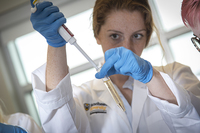Manchester PGx in Fort Wayne to maintain new national drug-gene database
It cross references information for researchers, genetic test developers and health care decision-makers
FORT WAYNE, IN (09/02/2022) — Manchester University students and faculty in the pharmacogenomics (PGx) program are taking an active role in maintaining a new nationwide database that cross references drug-gene interaction information in clinical guidelines with U.S. Food and Drug Administration data.
Its partner in the project, the Personalized Medicine Coalition (PMC), released the first quarterly listing of the database on Wednesday, Aug. 31.
Going forward, this resource will be updated each quarter, and much of the work will be done by a Manchester team that includes students in the Master of Science in PGx degree program and the dual degree program that allows students to earn a doctoral degree in pharmacy and the PGx master's degree.
"We are fortunate to be able to partner with the PMC to provide this PGx resource. This effort continues to showcase Manchester University's commitment to being a leader in PGx," said David Kisor, director of Pharmacogenomics Programs and professor of pharmaceutical sciences and pharmacogenomics at Manchester.
This listing will be a resource that puts in one place the latest scientific thinking in personalized medicine with other current information from the U.S. Food and Drug Administration's Table of Pharmacogenetic Associations and those listed in widely consulted clinical guidelines published by the Clinical Pharmacogenetics Implementation Consortium (CPIC).
Because it will be updated every quarter, it will help researchers, genetic test developers and health care decision-makers keep up with the latest information and reduce the effect of sometimes-conflicting information in the fast-evolving area of personalized medicine.
Pharmacogenomics, the study of the relationship between an individual's genetics and their response to a medication, allows physicians and other clinicians to prescribe drugs to maximize therapy early on and avoid or decrease the risk of adverse effects.
Offering both on-campus and online programs, Manchester PGx gives students the opportunity to play an active role in this cutting-edge and exciting field of science. It is based at Manchester University Fort Wayne.
The Manchester program is nationally recognized for innovative teaching. In 2021, the MU PGx program receive an Innovation in Teaching Award from the American Association of Colleges of Pharmacy PGx special interest group.
Contacts for the media
- David F. Kisor, BS, PharmD, RPh, FCP, is the founding director of Pharmacogenomics Programs at Manchester. To arrange an interview, email dfkisor@manchester.edu. https://www.manchester.edu/pharmacy/about-pharmacy/faculty-and-staff-profiles/kisor-david
- Daryl Pritchard, Ph.D., senior vice president for science policy at the Personalized Medicine Coalition, spearheaded PMC's involvement in the publication of the Cross-Reference of PGx Drug-Gene Association Listings in FDA's Table of Pharmacogenetic Associations and CPIC Clinical Guidelines. He can be reached at dpritchard@personalizedmedicinecoalition.org.
The Personalized Medicine Coalition, a 501(c)3 nonprofit organization comprised of more than 200 member institutions representing 14 distinct stakeholder groups within health care, promotes the understanding and adoption of personalized medicine concepts, services, and products to benefit patients and health systems
Related information
Pharmacogenomics at Manchester
Manchester online master's degree in nutrition and nutrigenomics. Nutrigenomics is the study of the relationship between an individual's genes and how they affect their response to food and nutrients.
Manchester online and in-person pharmacy doctoral program
What the CID says about pharmacogenomics
What the Mayo Clinic says about pharmacogenomics
Online press release for social media
Manchester University, in North Manchester and Fort Wayne, Ind., provides vibrant and transformative student experiences. Learn more at www.manchester.edu/about-manchester
Our mission
Manchester University respects the infinite worth of every individual and graduates persons of ability and conviction who draw upon their education and faith to lead principled, productive, and compassionate lives that improve the human condition.

